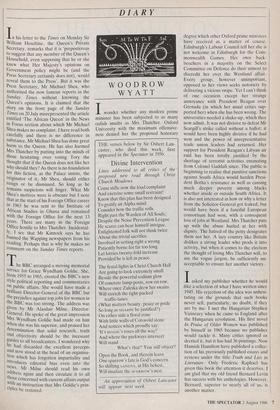DIARY
WOODROW WYATT
n his letter to the Times on Monday Sir William Hese!tine, the Queen's Private Secretary, remarks that it is 'preposterous to suggest that any member of the Queen's Household, even supposing that he or she knew what Her Majesty's opinions on Government policy might be (and the Press Secretary certainly does not), would reveal them to the Press'. But it was the Press Secretary, Mr Michael Shea, who authorised the now famous reports in the Sunday Times without knowing the Queen's opinions. It is claimed that the Story on the front page of the Sunday Times on 20 July misrepresented the article entitled 'The African Queen' in the News In Focus section about which Mr Michael Shea makes no complaint. I have read both carefully and there is no difference in substance. Mr Michael Shea has done great harm to the Queen. He has also harmed Mrs Thatcher by putting into the minds of those hesitating over voting Tory the thought that if the Queen does not like her why should they? As there is no foundation for this fiction, as the Palace insists, the originator of it, Mr Shea, should either resign or be dismissed. So long as he remains suspicions will linger. What Mr Shea's motives were is obscure but I note that at the start of his Foreign Office career in 1963 he was sent to the Institute of African Studies in Ghana and remained With the Foreign Office for the next 13 Years. There are many in the Foreign Office hostile to Mrs Thatcher. Incidental- ly, I see that Mr Kinnock says he has banned the Wapping newspapers from his reading. Perhaps that is why he makes no comment on the Sunday Times reports.
he BBC arranged a moving memorial service for Grace Wyndham Goidle. She, from 1955 to 1965, created the BBC's new Style political reporting and commentaries on public affairs. She would have made a brilliant Director-General of the BBC but the prejudice against top jobs for women in the BBC was too strong. The address was given by Mr Alasdair Milne, Director- General. He spoke of the great impression Mrs Wyndham Go!die had made on him When she was his superior, and praised her determination that solid research, truth and objectivity should be the incessant guides to all broadcasters. I wondered why he had discarded the excellent precepts and now stood at the head of an organisa- tion which has forgotten impartiality and introduces editorial bias even into the news. Mr Milne should read his own address again and then circulate it to all those concerned with current affairs output with an instruction that Mrs Goldie's prin- ciples be restored. Iwonder whether any modern prime minister has been subjected to as many oafish insults as Mrs Thatcher. Oxford University with the maximum offensive- ness denied her the proposed honorary
degree which other Oxford prime ministers have received as a matter of course. Edinburgh's Labour Council tell her she is not welcome in Edinburgh for the Com- monwealth Games. Her own back- benchers in a majority on the Select Committee on Defence do their utmost to discredit her over the Westland affair. Every group, however unimportant, opposed to her views seeks notoriety by delivering a vicious swipe. Yet I can't think of one occasion except her strange annoyance with President Reagan over Grenada (in which her usual critics sup- ported her) when she has been wrong. The universities needed a shake-up, which they now admit. It was not divisive to defeat Mr Scargill's strike called without a ballot: it would have been highly divisive if he had won and the power of unrepresentative trade union leaders had returned. Her support for President Reagan's Libyan air raid has been totally justified by the shortage of terrorist activities emanating from Colonel Gaddafi since. The public is beginning to realise that punitive sanctions against South Africa would harden Presi- dent Botha's resistance as well as causing much deeper poverty among blacks whether inside or outside South Africa. It is also not interested in how or why a letter from the Solicitor-General got leaked, but would have been if a fanciful European consortium had won, with a consequent loss of jobs at Westland. Mrs Thatcher puts up with the abuse hurled at her with dignity. The hatred of the petty denigrates them not her. A lazy country like Britain dislikes a strong leader who prods it into activity, but when it comes to the election the thought of losing Mrs Thatcher will, to use the vogue jargon, be sufficiently un- acceptable to ensure her another victory.
Iasked my publisher whether he would ,like a selection of what I have written since 1945. His rejection of the idea was unhesi- tating on the grounds that such books never sell, particularly, no doubt, if they are by me. I met the Hungarian Stephen Vizinczey when he came to England after the Hungarian revolution. His first novel In Praise of Older Women was published by himself in 1965 because no publisher would tackle it. Many critics ignored or decried it, but it has had 36 printings. Now Hamish Hamilton have published a collec- tion of his previously published essays and reviews under the title Truth and Lies in Literature. Only Frederic Raphael has given this book the attention it deserves. I am glad that my old friend Bernard Levin has success with his anthologies. However, Bernard, superior to nearly all of us, is another matter.










































 Previous page
Previous page